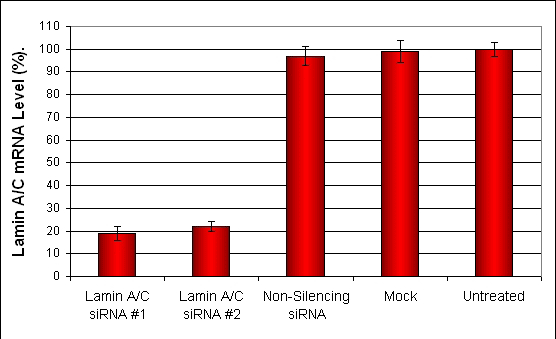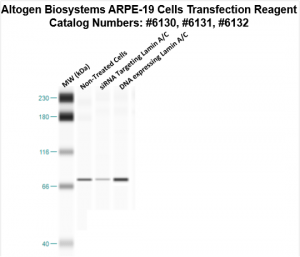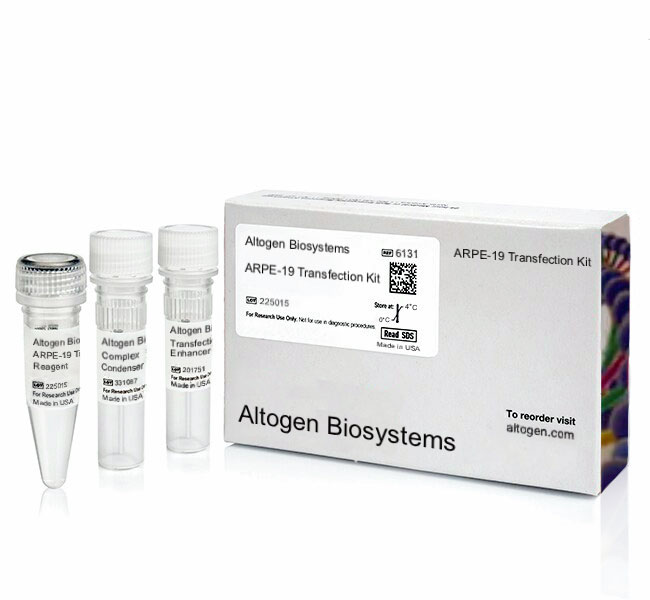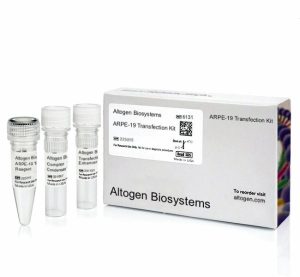Description
Purchase Orders: Click “Add to Cart” button to order, then email PO to orders@altogen.com.
Product Availability: In Stock.
Transfection Reagent for ARPE-19 Cells (Retinal Pigment Epithelium Cells, CRL-2302)
-
Proprietary cationic lipids formulation
-
High transfection efficiency of small RNA (siRNA, shRNA, miRNA), mRNA, pDNA
-
Effective and robust intracellular delivery
-
Kit includes Transfection Enhancer reagent
-
Produces consistent results, lot-to-lot, plate-to-plate, and well-to-well
-
Work in the presence of serum
-
A proven reagent for establishing stable cell lines
-
Optimized transfection protocols are adapted for use with both standard & reverse transfection methods
-
Download in vitro ARPE-19 transfection protocol: [PDF]
- Download ARPE-19 CRISPR/Cas9 transfection protocol: [PDF]
-
Download PowerPoint presentation for ARPE-19 cells transfection kit: [PPT]
- UPC/GTIN/EAN: 860002089721
-
Brand: ALTOGEN®, developed and manufactured by Altogen Biosystems
Transfection Efficiency:
Reagent exhibits at least 78% transfection efficiency of siRNA delivery. Transfection efficiency was determined by real-time RT-PCR.
Product Description:
Enhanced transfection kit designed for superior efficiency in the ARPE19 cell line, these cells are commonly used in research related to retinal diseases and the development of novel therapies for these diseases.
Transfection Protocol and SDS:
Download Altogen Biosystems ARPE-19 Transfection Protocol: [PDF]
Download SDS: [PDF]
ARPE-19 Cell Line:
Studies of the retinal pigment epithelium (RPE) have proven to be a promising approach in finding novel therapeutics for AMD (age-related macular degeneration), the primary cause of blindness globally. Hardly accessible in vivo, retinal pigment epithelium is a cell layer that sustains retinal cells in the eye. RPE is located at the back of the eye, and its deterioration could lead to loss of vision. The ARPE-19 cell line was established using eye tissue of a 19-year-old male patient. These diploid cells exhibit epithelial cell morphology and morphological polarization in certain conditions. ARPE-19 cells are essential in scientific research by providing the role of a transfection host in preclinical studies of cancers like retinoblastoma and choroidal melanoma. It could be beneficial in cell and molecular biology research due to the expression of RPE-specific markers (RPE-65 and CRALBP) antigens. ARPE-19 is a human retinal pigment epithelium (RPE) cell line that was derived from a donor with no known ocular disease. RPE cells play a crucial role in maintaining the health and function of the retina, and dysfunction of these cells is implicated in a variety of retinal diseases, including age-related macular degeneration (AMD). ARPE19 cells are commonly used in research related to retinal diseases and the development of novel therapies for these diseases. In particular, they have been used to study the mechanisms underlying the pathogenesis of AMD, as well as the effects of potential therapeutic agents. ARPE-19 cells are cultured as adherent monolayers and have been shown to express markers of RPE differentiation, such as RPE65 and bestrophin. They are also known to phagocytose photoreceptor outer segments and secrete growth factors and cytokines that are involved in regulating retinal function. In addition to their use in studying retinal diseases, ARPE19 cells have been used to study the effects of potential therapeutic agents for other diseases, such as cancer and viral infections. They have also been used to study the interactions between RPE cells and other cell types in the retina, such as photoreceptors and immune cells.
Data:

Figure 1. siRNAs targeting Lamin A/C mRNA or non-silencing control siRNA were transfected into ARPE-19 cells following the recommended protocol. At 48 hours post-transfection the cells were analyzed by qRT-PCR for Lamin A/C gene expression levels. 18S rRNA levels were used to normalize the Lamin A/C data. Values are normalized to untreated sample. Data are means ± SD (n=4).

Figure 2. Protein expression of Lamin A/C in ARPE-19 cells. DNA plasmid expressing Lamin A/C or siRNA targeting Lamin A/C were transfected into ARPE-19 cells following Altogen Biosystems transfection protocol. At 72 hours post-transfection the cells were analyzed by Western Blot for protein expression levels (normalized by total protein, 10 µg of total protein loaded per each well). Untreated cells used as a negative control.
Selected in vivo transfection product citations (ALTOGEN® IN VIVO Transfection Kits used in the following publications):
- Nature Biotechnology. 2011 29(4):341-5. Delivery of siRNA to the mouse brain by … Alvarez-Erviti et al [PDF]
- Cancer Research. 2011 71(15):5144-53. Inhibition of miR-193a expression by… Iliopoulos et al [PDF]
- RNA. 2010 16(11):2108-19. RNase L releases a small RNA from HCV RNA that refolds … Malathi et al [PDF]
- Diabetologia. 2012 55(7):2069-79. The p47phox- and NADPH oxidase organiser 1 … Youn et al [PDF]
- British Journal of Cancer. 2012 107(3):516-26. TIGAR induces p53-mediated cell-cycle … Madan et al [PDF]
- Jounal of Biological Chemistry. 2012 287(4):2907. Chaperoning of mutant p53 protein … Gogna et al [PDF]
- PLoS Pathogens. 2012 8(8) Uridine composition of the poly-U/UC tract of HCV RNA … Schnell et al [PDF]
- Hypertension. 2015 65(2):430-9. Neurokinin 3 receptor and phosphocholine transferase… Parchim et al [PDF]
Altogen Biosystems transfection and electroporation products for life sciences and cancer research. Company developed two types of in vivo delivery kits for animal research: Tissue-targeted reagents (delivery to liver, pancreas, and kidney tissues), and broad range in vivo delivery reagents (PEG-Liposome, Nanoparticle-based, Lipid-based, and Polymer-based kits). Advanced formulation of reagents and optimized transfection protocols provide efficient intracellular delivery of proteins, DNA, mRNA, shRNA, siRNA, and other negatively charged molecules in vitro and in vivo. Read more about transfection technology at Altogen’s Transfection Resource. Altogen Labs provides GLP compliant contract research studies for preclinical research, IND applications, and drug development. Biology CRO services include: Xenograft models, ELISA assay development, cell-based and tissue targeted RNAi studies, safety pharm/tox assays, and other studies (visit AltogenLabs.com).
Volume Options:
- 0.5 ml (Catalog #6130)
- 1.5 ml (Catalog #6131)
- 1.5 ml CRISPR (Catalog #2107)
- 8.0 ml (Catalog #6132)
Purchase Orders: Click “Add to Cart” button to order, then email PO to orders@altogen.com.
Product Availability: In Stock.






